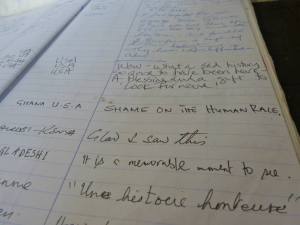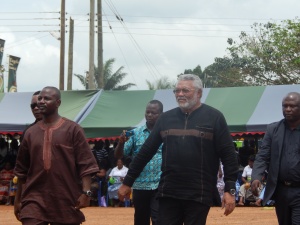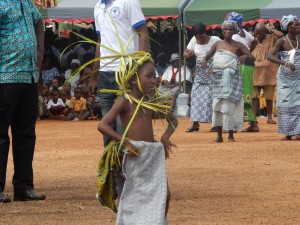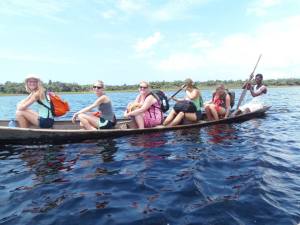A few weeks ago, CIEE took us on a day-trip to Cape Coast, which is about 2 hours outside of Accra. Cape Coast is a popular place to visit mainly because of Kakum National Park and the slave castles.
We started our day with a tour of Elmina Castle, the largest of the castles in the trans-Atlantic slave trade. I’ve always enjoyed getting to experience history where it took place versus just reading about it in a book and this experience was no different. It was, however, one of the most emotional and heart-wrenching things I have ever been a part of.
The tour guide was especially helpful when it came to telling us all about what happened in the castle. He brought us to each room and explained what it was used for. What was so surreal to me was that I was standing in a place where so many horrible things occurred. A few hundred years ago, there were so many people being tortured and neglected in the very room I was standing in. There was just so much to take in.
A few things stuck out to me that really helped me understand the stark contrast between what it meant to be white and black at that time.
At one point, the guide showed us two prison cells: one for whites and one for blacks. The prison cell for white people was used as a punishment for white guards who were misbehaving (i.e. not taking orders, etc.). We got the chance to go in the prison cell and it wasn’t all that bad. There were windows in a few places and it was pretty breezy. It was also in a spot where the sun hit, so it was so easy to see. The guards typically had to stay in this cell for a few days. Directly next to the white prison cell was the door to the black prison cell, which looked like a door to a dungeon. When the tour guide opened the door for us to go in, we could barely see where we were going. First of all, the cell was half the size of the white prison cell and it was very difficult to fit everyone inside. When we were all inside, the guide shut the door on us and it was pitch black. He explained that when captured slaves misbehaved (i.e. rebelled, tried to escape, etc.), they would be put in this prison cell. There could be up to 40 people in the dungeon at a time and once you went in, you weren’t taken out until you were dead. As a matter of fact, they wouldn’t clear out the prison cell until all the inhabitants were dead. Not only were the captured slaves subjected to several diseases and not given any food, but also they were expected to sit inside this cell and rot until they died. It was such a stark contrast to the prison cell for white guards, which was directly next to this cell. Two completely different worlds were represented, only a few feet apart.
Another thing that really spoke to me was when we went to the governor’s apartment, which was located in the castle. It was upstairs and it was huge. The rooms were vast in size and there was so much open space. It’s probably the equivalent of the size of my house at home. I just can’t understand how a person could live so luxuriously (especially during this timeframe) when so much injustice against humanity was being committed just a few hundred feet away. When I looked out the windows at this apartment, there was a clear view of the slave dungeons where people were being treated like animals. What perplexes me the most is how a person could live within this community and not feel at all guilty or responsible. While I will never understand why people thought that this kind of treatment was acceptable, it’s one thing to participate in this activity during the day and go home at night, but it’s completely different to live among this way of life and never feel any remorse. Humanity is sometimes so disgusting to me.
The most emotional and moving moment for me, however, was when we went through the door or no return. Slaves were led through this door (if they survived the conditions at the castle) and put on a boat to the Americas. This was the last time that slaves would be in their home country and there was no coming back. Our tour guide led us through the tunnel and the steps to the final room where the door of no return was located. He asked us to partake in a moment of silence and then had us sing ‘Amazing Grace,’ which was written during the trans-Atlantic slave trade. It was such a touching moment and is something I will never forget.
After the tour, we sat in a room and had a brief discussion just reflecting on our experiences and emotions. While I didn’t speak, I really enjoyed hearing other people’s thoughts on such a heavy topic.
After the castle, our day took a happy turn and we went to Kakum National Park to do the canopy walk. We went on a hike that consisted crossing over 7 canopies in the jungle. It was a lot of fun, even though the canopies were very rickety and some of the guys on my trip were shaking them. Talk about a true team-building experience!
Once we were finished in Kakum, we went to a late lunch at a crocodile resort in Cape Coast. After eating, I got to touch a crocodile, which was super cool! I’m so happy that I lived to tell the tale, because it kept moving around before I went by it to touch it! It was a close call.
Peace&Blessings,
Paige


























